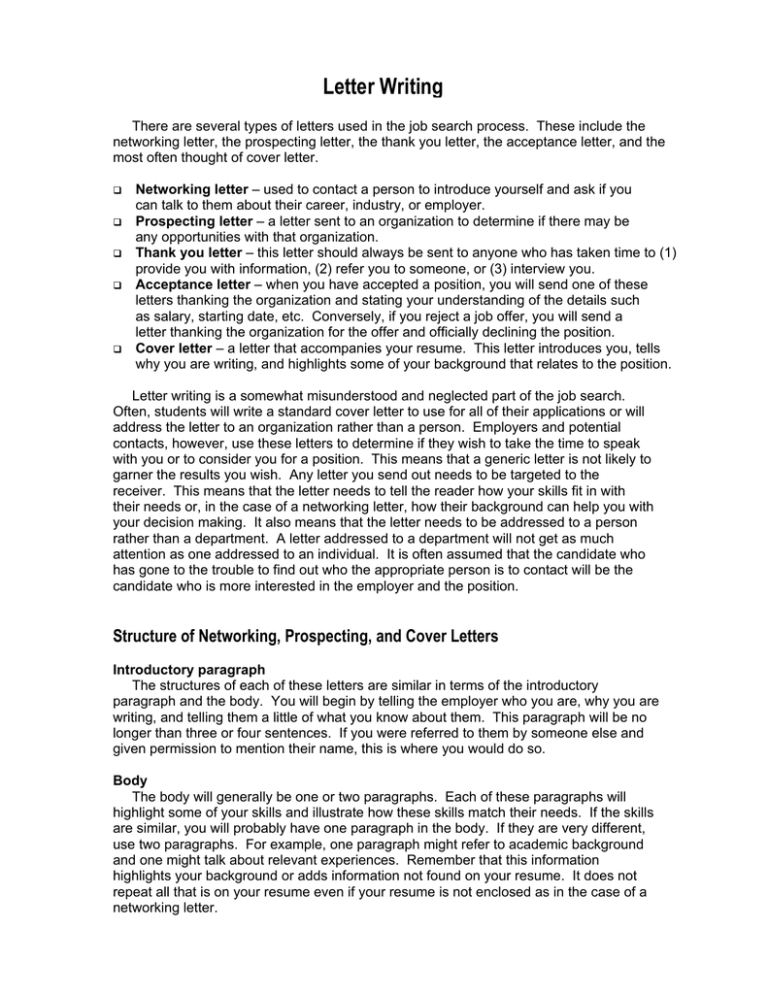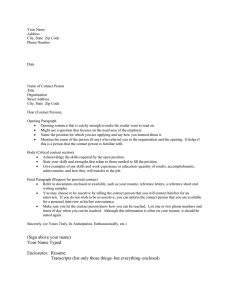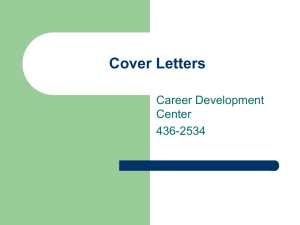Letter Writing
advertisement

Letter Writing There are several types of letters used in the job search process. These include the networking letter, the prospecting letter, the thank you letter, the acceptance letter, and the most often thought of cover letter. Networking letter – used to contact a person to introduce yourself and ask if you can talk to them about their career, industry, or employer. Prospecting letter – a letter sent to an organization to determine if there may be any opportunities with that organization. Thank you letter – this letter should always be sent to anyone who has taken time to (1) provide you with information, (2) refer you to someone, or (3) interview you. Acceptance letter – when you have accepted a position, you will send one of these letters thanking the organization and stating your understanding of the details such as salary, starting date, etc. Conversely, if you reject a job offer, you will send a letter thanking the organization for the offer and officially declining the position. Cover letter – a letter that accompanies your resume. This letter introduces you, tells why you are writing, and highlights some of your background that relates to the position. Letter writing is a somewhat misunderstood and neglected part of the job search. Often, students will write a standard cover letter to use for all of their applications or will address the letter to an organization rather than a person. Employers and potential contacts, however, use these letters to determine if they wish to take the time to speak with you or to consider you for a position. This means that a generic letter is not likely to garner the results you wish. Any letter you send out needs to be targeted to the receiver. This means that the letter needs to tell the reader how your skills fit in with their needs or, in the case of a networking letter, how their background can help you with your decision making. It also means that the letter needs to be addressed to a person rather than a department. A letter addressed to a department will not get as much attention as one addressed to an individual. It is often assumed that the candidate who has gone to the trouble to find out who the appropriate person is to contact will be the candidate who is more interested in the employer and the position. Structure of Networking, Prospecting, and Cover Letters Introductory paragraph The structures of each of these letters are similar in terms of the introductory paragraph and the body. You will begin by telling the employer who you are, why you are writing, and telling them a little of what you know about them. This paragraph will be no longer than three or four sentences. If you were referred to them by someone else and given permission to mention their name, this is where you would do so. Body The body will generally be one or two paragraphs. Each of these paragraphs will highlight some of your skills and illustrate how these skills match their needs. If the skills are similar, you will probably have one paragraph in the body. If they are very different, use two paragraphs. For example, one paragraph might refer to academic background and one might talk about relevant experiences. Remember that this information highlights your background or adds information not found on your resume. It does not repeat all that is on your resume even if your resume is not enclosed as in the case of a networking letter. Closing The closing paragraph tells the reader what follow-up to expect. If you are writing a prospecting or cover letter, be sure to state that your resume is enclosed. Also make sure you thank them for considering your request or for their time. One of the most common job search mistakes is not following up on your letter. Many people say something like "I look forward to hearing from you." Instead, it is more effective and impressive if you call them to follow-up. Your letter should say something like "I will phone you in a week to discuss the possibilities." Thank you and acceptance letters Thank you and acceptance letters are very individual. As with other letters, there is an opening, a body, and a closing. The opening paragraph will be used to thank the person either for their time or for their offer. In the body, you will restate something you discussed in the interview that you found interesting and why you fit their needs. If it is an acceptance letter, you will restate the terms of the offer. The last paragraph reviews your understanding of what is to happen next. If you are to hear from the person in two weeks, tell them how much you are looking forward to hearing from them in two weeks. If it is an acceptance letter, tell them how much you are looking forward to starting on such and such date. If you are declining an offer or withdrawing your application, keep your letter short, sweet and professional. Simply thank them for their time and/or consideration and tell them it was not the appropriate opportunity for you at this time. Letter writing tips When writing a professional letter, make sure to use a professional format. This includes putting your address, the date, and their name and address at the top of the page. Do not forget to sign your letter in black ink. At the end of the letter, if you have enclosed a resume, put "Enclosure: resume" after your name at the bottom of the letter. Also remember to keep the letter short. It should be no more than five paragraphs and fit onto one page. Typographical errors and spelling mistakes may be enough to eliminate you from consideration for some positions. Make sure you proofread it carefully and get someone else to proofread it for you as well. Lastly, remember to be positive in the letter. Don't point out your shortcomings. Writing something like "I know I didn't major in journalism but…" is not going to get you in the door. Instead, emphasize those skills and experiences that relate to the needs of the employer. Summary The letters you write in the process of your job search will be very important to your success. Examples of the variety of letters can be found in the Job Choices magazine. This magazine is free and can be picked up in Career Services. There are also cover letter books available for check out in the Career Library and a few examples provided in this notebook. We suggest you create a draft, realizing that each letter will change depending on the recipient. We would be happy to critique your letter. You can either (1) make an appointment and have your draft critiqued while you are there or (2) drop your draft off in Career Services and make an appointment on a different day to obtain your feedback. Either way, we will be happy to critique it for you.

